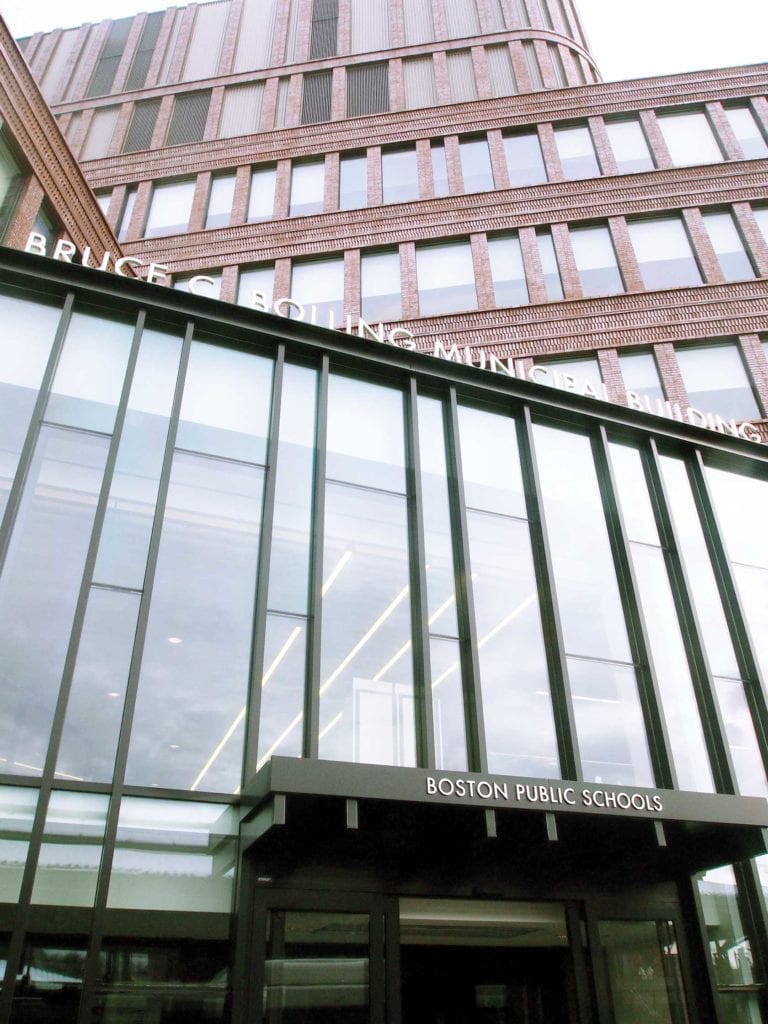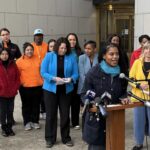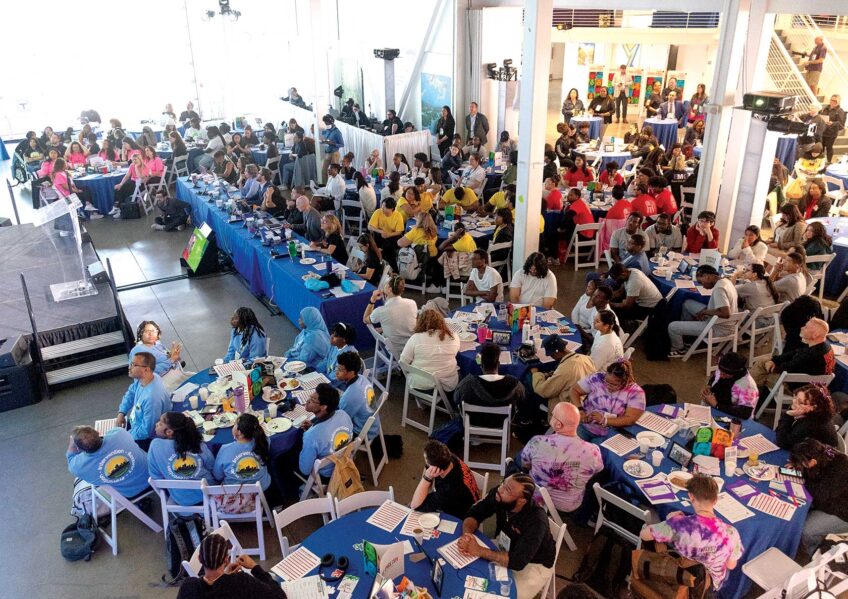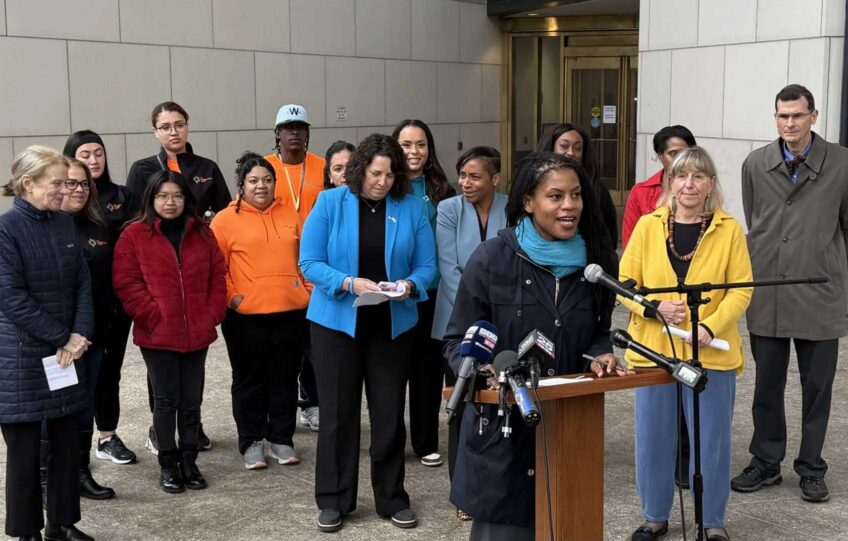
Boston Public Schools Superintendent Brenda Cassellius last week signed a memorandum of understanding with State Department of Elementary and Secondary Education Commissioner Jeffrey Riley agreeing on a course of action to correct inequities in the city’s schools.
The MOU comes after the DESE released an audit critical of “major structural problems” within the district’s 125 schools, citing among other things inadequacies in instruction of English language learners and special education students and persistent underperformance in 33 BPS schools that the state ranks among the lowest-performing 10% in the state.
Riley signed the MOU on March 10, outlining what he said is a new approach to a district intervention, setting goals for improvements that span from the hiring of a more diverse teaching staff to improving student outcomes at the 33 district schools that the state will classify as Transformation Schools. The state classification provides schools with access to resources such as coaching for teachers and administrators, but no additional financial resources.
In other state interventions in recent years, DESE has opted for district takeovers, such as the ongoing nine-year receivership of the Lawrence district, or takeovers of individual schools, such as the Dever and Holland schools in Boston. Now, Riley appears committed to exploring other avenues.
“Together, we have laid out an alternative approach that will commit BPS to a focused set of priority initiatives for the district,” Riley wrote in a letter addressed to Cassellius and attached to the audit report.
In the MOU, Cassellius and Riley agree to set benchmarks for improvements in the Transformation Schools, including boosting scores on the MCAS standardized test and the ACCESS test for English language learners.

Brenda Cassellius. BANNER PHOTO
The agreement comes after Cassellius in January released a five-year master plan aimed at addressing many of the same issues Riley identified in his audit. Her report was informed in part by visiting all 125 BPS schools and conducting numerous meetings with teachers, students and parents.
“[The MOU] does align well with the strategic plan,” Cassellius told the Banner. “It validated the observations I made and what’s in the strategic plan.”
In Mayor Martin Walsh’s FY2021 BPS budget, released in January, he dedicated $19 million in additional funding to the 33 schools now designated as Transformation Schools — part of a three-year, $100 million commitment to provide more resources to BPS schools, guided by Cassellius’ master plan.
District officials and DESE also have agreed to metrics that the district must meet on an annual basis, including MCAS scores and English language proficiency for English language learners. The MOU indicates that the timetable and specific metrics are to be worked out within the next 60 days.
The current citywide school closure, slated to last through late April, will make it difficult to measure student progress, Cassellius said, given that the scheduled English portion of the MCAS exam has already been cancelled.
“Already there has been disruption with the students’ learning,” she said. “We have to think about how this affects student credits and graduation.”

Commissioner of Elementary and Secondary Education Jeffrey Riley, with Gov. Charlie Baker, during a 2018 event. BANNER FILE PHOTO
Boston Teachers Union President Jessica Tang called it “troubling” that the state released the MOU during the state of emergency around the COVID-19 epidemic and did not involve teachers or families in the agreements made with the district.
“We were not at the table for the creation of this MOU and believe educators and families need to be at the table moving forward,” she said in a statement released to the news media last Friday.
DESE has pledged to allocate at least $4 million a year for the next three years to help support its initiatives in the BPS schools. That funding amounts to three-tenths of a percentage point in the $1.3 billion BPS budget.
Some DESE officials will work directly with BPS officials on recruiting teachers of color.
In her statement, Tang noted that the state audit confirmed problems with BPS that teachers have complained of for years.
“The report validates well-known concerns that the Boston Teachers Union long ago identified for the state as reasons for urgent and additional state investments — not takeovers — in public education, particularly with regard to the special education and English learner needs of Boston students,” Tang said.
Tang did not mince words in laying a share of the blame for the conditions of the schools on the state, citing its underfunding of Boston’s schools.
“The state has ignored those needs for decades, and is just now catching up to them, so the state has no grounds to say it should run the Boston schools that it has starved for so long,” she said. “Thirty years of state-level divestment from public education combined with a churn of district leadership has had dire consequences for Boston students.”
In addition to the 33 schools tagged as Transformation Schools, DESE has designated 15 schools in East Boston and Charlestown to be part of a new Kaleidoscope Collective for Learning initiative, a project Riley created to help schools rethink classroom instruction around a concept he calls “deeper learning.” The initial Kaleidoscope pilot is slated to run through June 2021.
In the MOU, Riley lists expansion of the Kaleidoscope Collective into Roxbury and Dorchester schools among the outstanding issues to be negotiated over the next 60 days.
Tang cautioned against allowing DESE any greater leeway in intervening in Boston’s schools.
“While the memorandum does not constitute a state takeover, it appears to leave the door open in ways that could be dangerous for students and our communities, given the failed track record of top-down district takeovers across the country,” she said.
Erratum: An earlier version of this story identified the Dearborn school as being under receivership. The Paul A. Dever school is under state receivership, not the Dearborn.







